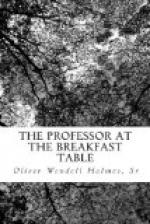Never mind where he blew them to,—I said; for the little man was getting red in the face, and I did n’t know what might come next.
This episode broke me up, as the jockeys say, out of my square conversational trot; but I settled down to it again.
—A man that knows men, in the street, at their work, human nature in its shirt-sleeves, who makes bargains with deacons, instead of talking over texts with them, a man who has found out that there are plenty of praying rogues and swearing saints in the world,—above all, who has found out, by living into the pith and core of life, that all of the Deity which can be folded up between the sheets of any human book is to the Deity of the firmament, of the strata, of the hot aortic flood of throbbing human life, of this infinite, instantaneous consciousness in which the soul’s being consists,—an incandescent point in the filament connecting the negative pole of a past eternity with the positive pole of an eternity that is to come,—that all of the Deity which any human book can hold is to this larger Deity of the working battery of the universe only as the films in a book of gold-leaf are to the broad seams and curdled lumps of ore that lie in unsunned mines and virgin placers,—Oh!—I was saying that a man who lives out-of-doors, among live people, gets some things into his head he might not find in the index of his “Body of Divinity.”
I tell you what,—the idea of the professions’ digging a moat round their close corporations, like that Japanese one at Jeddo, on the bottom of which, if travellers do not lie, you could put Park Street Church and look over the vane from its side, and try to stretch another such spire across it without spanning the chasm,—that idea, I say, is pretty nearly worn out. Now when a civilization or a civilized custom falls into senile dementia, there is commonly a judgment ripe for it, and it comes as plagues come, from a breath,—as fires come, from a spark.
Here, look at medicine. Big wigs, gold-headed canes, Latin prescriptions, shops full of abominations, recipes a yard long, “curing” patients by drugging as sailors bring a wind by whistling, selling lies at a guinea apiece,—a routine, in short, of giving unfortunate sick people a mess of things either too odious to swallow or too acrid to hold, or, if that were possible, both at once.
—You don’t know what I mean, indignant and not unintelligent country-practitioner? Then you don’t know the history of medicine,—and that is not my fault. But don’t expose yourself in any outbreak of eloquence; for, by the mortar in which Anaxarchus was pounded! I did not bring home Schenckius and Forestus and Hildanus, and all the old folios in calf and vellum I will show you, to be bullied by the proprietor, of a “Wood and Bache,” and a shelf of peppered sheepskin reprints by Philadelphia Editors. Besides, many of the profession and I know a little something of each other, and you don’t think I am such a simpleton as to lose their good opinion by saying what the better heads among them would condemn as unfair and untrue? Now mark how the great plague came on the generation of drugging doctors, and in what form it fell.




